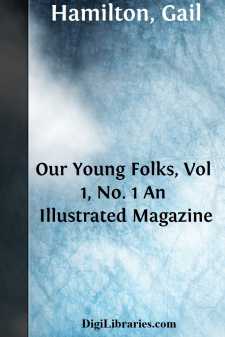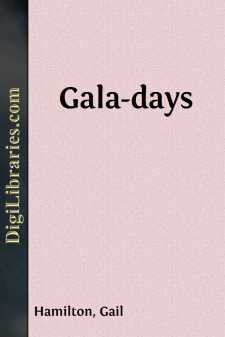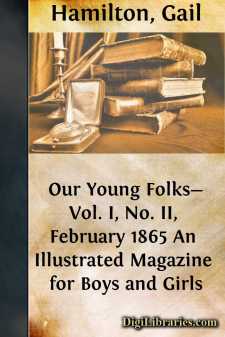Categories
- Antiques & Collectibles 13
- Architecture 36
- Art 48
- Bibles 22
- Biography & Autobiography 813
- Body, Mind & Spirit 142
- Business & Economics 28
- Children's Books 17
- Children's Fiction 14
- Computers 4
- Cooking 94
- Crafts & Hobbies 4
- Drama 346
- Education 46
- Family & Relationships 57
- Fiction 11829
- Games 19
- Gardening 17
- Health & Fitness 34
- History 1377
- House & Home 1
- Humor 147
- Juvenile Fiction 1873
- Juvenile Nonfiction 202
- Language Arts & Disciplines 88
- Law 16
- Literary Collections 686
- Literary Criticism 179
- Mathematics 13
- Medical 41
- Music 40
- Nature 179
- Non-Classifiable 1768
- Performing Arts 7
- Periodicals 1453
- Philosophy 64
- Photography 2
- Poetry 896
- Political Science 203
- Psychology 42
- Reference 154
- Religion 513
- Science 126
- Self-Help 84
- Social Science 81
- Sports & Recreation 34
- Study Aids 3
- Technology & Engineering 59
- Transportation 23
- Travel 463
- True Crime 29
Our Young Folks, Vol 1, No. 1 An Illustrated Magazine
by: Gail Hamilton
Categories:
Description:
Excerpt
HUM, THE SON OF BUZ.
At Rye Beach, during our summer's vacation, there came, as there always will to seaside visitors, two or three cold, chilly, rainy days,—days when the skies that long had not rained a drop seemed suddenly to bethink themselves of their remissness, and to pour down water, not by drops, but by pailfuls. The chilly wind blew and whistled, the water dashed along the ground, and careered in foamy rills along the roadside, and the bushes bent beneath the constant flood. It was plain that there was to be no sea-bathing on such a day, no walks, no rides; and so, shivering and drawing our blanket-shawls close about us, we sat down to the window to watch the storm outside. The rose-bushes under the window hung dripping under their load of moisture, each spray shedding a constant shower on the spray below it. On one of these lower sprays, under the perpetual drip, what should we see but a poor little humming-bird, drawn up into the tiniest shivering ball, and clinging with a desperate grasp to his uncomfortable perch. A humming-bird we knew him to be at once, though his feathers were so matted and glued down by the rain that he looked not much bigger than a honey-bee, and as different as possible from the smart, pert, airy little character that we had so often seen flirting with the flowers. He was evidently a humming-bird in adversity, and whether he ever would hum again looked to us exceedingly doubtful. Immediately, however, we sent out to have him taken in. When the friendly hand seized him, he gave a little, faint, watery squeak, evidently thinking that his last hour was come, and that grim Death was about to carry him off to the land of dead birds. What a time we had reviving him,—holding the little wet thing in the warm hollow of our hands, and feeling him shiver and palpitate! His eyes were fast closed; his tiny claws, which looked slender as cobwebs, were knotted close to his body, and it was long before one could feel the least motion in them. Finally, to our great joy, we felt a brisk little kick, and then a flutter of wings, and then a determined peck of the beak, which showed that there was some bird left in him yet, and that he meant at any rate to find out where he was.
Unclosing our hands a small space, out popped the little head with a pair of round brilliant eyes. Then we bethought ourselves of feeding him, and forthwith prepared him a stiff glass of sugar and water, a drop of which we held to his bill. After turning his head attentively, like a bird who knew what he was about and didn't mean to be chaffed, he briskly put out a long, flexible tongue, slightly forked at the end, and licked off the comfortable beverage with great relish. Immediately he was pronounced out of danger by the small humane society which had undertaken the charge of his restoration, and we began to cast about for getting him a settled establishment in our apartment. I gave up my work-box to him for a sleeping-room, and it was medically ordered that he should take a nap. So we filled the box with cotton, and he was formally put to bed with a folded cambric handkerchief round his neck, to keep him from beating his wings. Out of his white wrappings he looked forth green and grave as any judge with his bright round eyes. Like a bird of discretion, he seemed to understand what was being done to him, and resigned himself sensibly to go to sleep.
The box was covered with a sheet of paper perforated with holes for purposes of ventilation; for even humming-birds have a little pair of lungs, and need their own little portion of air to fill them, so that they may make bright scarlet little drops of blood to keep life's fire burning in their tiny bodies. Our bird's lungs manufactured brilliant blood, as we found out by experience; for in his first nap he contrived to nestle himself into the cotton of which his bed was made, and to get more of it than he needed into his long bill. We pulled it out as carefully as we could, but there came out of his bill two round, bright, scarlet, little drops of blood. Our chief medical authority looked grave, pronounced a probable hemorrhage from the lungs, and gave him over at once. We, less scientific, declared that we had only cut his little tongue by drawing out the filaments of cotton, and that he would do well enough in time,—as it afterward appeared he did,—for from that day there was no more bleeding....




